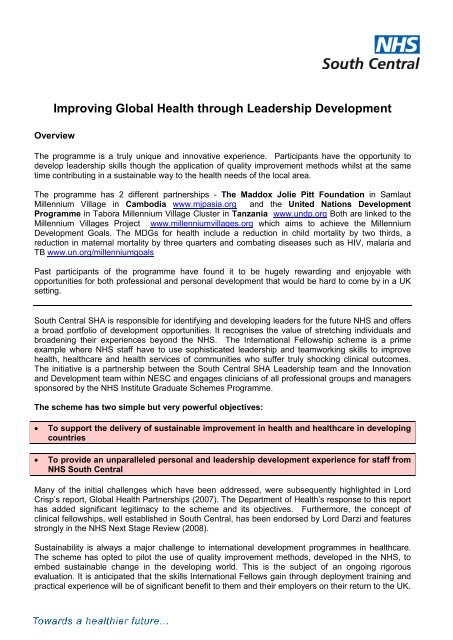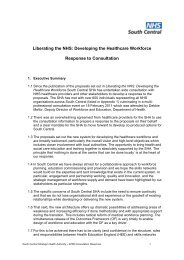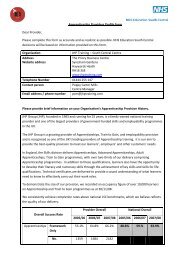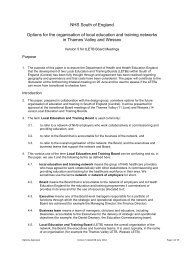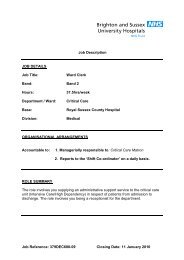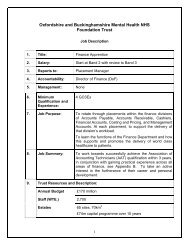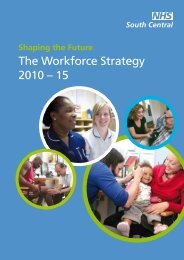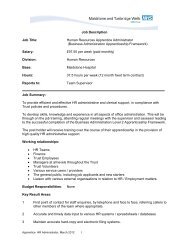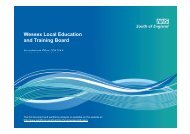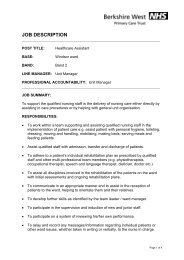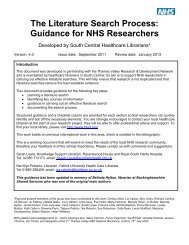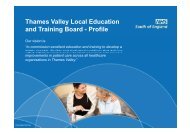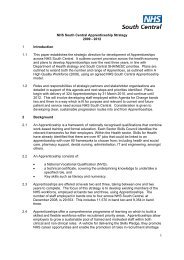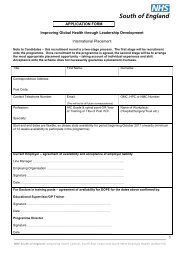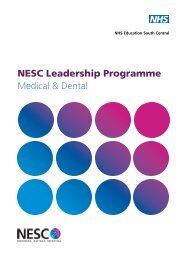Improving Global Health through Leadership Development
Improving Global Health through Leadership Development
Improving Global Health through Leadership Development
Create successful ePaper yourself
Turn your PDF publications into a flip-book with our unique Google optimized e-Paper software.
<strong>Improving</strong> <strong>Global</strong> <strong>Health</strong> <strong>through</strong> <strong>Leadership</strong> <strong>Development</strong><br />
Overview<br />
The programme is a truly unique and innovative experience. Participants have the opportunity to<br />
develop leadership skills though the application of quality improvement methods whilst at the same<br />
time contributing in a sustainable way to the health needs of the local area.<br />
The programme has 2 different partnerships - The Maddox Jolie Pitt Foundation in Samlaut<br />
Millennium Village in Cambodia www.mjpasia.org and the United Nations <strong>Development</strong><br />
Programme in Tabora Millennium Village Cluster in Tanzania www.undp.org Both are linked to the<br />
Millennium Villages Project www.millenniumvillages.org which aims to achieve the Millennium<br />
<strong>Development</strong> Goals. The MDGs for health include a reduction in child mortality by two thirds, a<br />
reduction in maternal mortality by three quarters and combating diseases such as HIV, malaria and<br />
TB www.un.org/millenniumgoals<br />
Past participants of the programme have found it to be hugely rewarding and enjoyable with<br />
opportunities for both professional and personal development that would be hard to come by in a UK<br />
setting.<br />
South Central SHA is responsible for identifying and developing leaders for the future NHS and offers<br />
a broad portfolio of development opportunities. It recognises the value of stretching individuals and<br />
broadening their experiences beyond the NHS. The International Fellowship scheme is a prime<br />
example where NHS staff have to use sophisticated leadership and teamworking skills to improve<br />
health, healthcare and health services of communities who suffer truly shocking clinical outcomes.<br />
The initiative is a partnership between the South Central SHA <strong>Leadership</strong> team and the Innovation<br />
and <strong>Development</strong> team within NESC and engages clinicians of all professional groups and managers<br />
sponsored by the NHS Institute Graduate Schemes Programme.<br />
The scheme has two simple but very powerful objectives:<br />
• To support the delivery of sustainable improvement in health and healthcare in developing<br />
countries<br />
• To provide an unparalleled personal and leadership development experience for staff from<br />
NHS South Central<br />
Many of the initial challenges which have been addressed, were subsequently highlighted in Lord<br />
Crisp’s report, <strong>Global</strong> <strong>Health</strong> Partnerships (2007). The Department of <strong>Health</strong>’s response to this report<br />
has added significant legitimacy to the scheme and its objectives. Furthermore, the concept of<br />
clinical fellowships, well established in South Central, has been endorsed by Lord Darzi and features<br />
strongly in the NHS Next Stage Review (2008).<br />
Sustainability is always a major challenge to international development programmes in healthcare.<br />
The scheme has opted to pilot the use of quality improvement methods, developed in the NHS, to<br />
embed sustainable change in the developing world. This is the subject of an ongoing rigorous<br />
evaluation. It is anticipated that the skills International Fellows gain <strong>through</strong> deployment training and<br />
practical experience will be of significant benefit to them and their employers on their return to the UK.
Fellows undertake pre-deployment training to prepare them for the experience, to maximise their<br />
safety and equip them with skills to help to bring about change.<br />
This includes:<br />
• Quality Improvement methodologies<br />
• the Medical <strong>Leadership</strong> Qualities Framework<br />
• an understanding of nutrition in the developing world<br />
• Cultural awareness<br />
Each of the International Fellows takes a lead on a major topic but there is significant collaboration<br />
across projects. Importantly, they are part of a wider team giving the opportunity to experience and<br />
understand the inter-dependencies of agriculture, housing sanitation, water, transport and health.<br />
Cambodia<br />
Fellows from different healthcare backgrounds have been working in Battambang Referral Hospital<br />
and in Samlaut Millennium Village with MJP since August 2008. They have been involved in a variety<br />
of projects including:<br />
• Conducting a <strong>Health</strong> Needs Assessment survey<br />
• Setting up a family planning service in the local health post and community<br />
• Training in the use of antenatal care records to recognise complications<br />
• Promotion of exclusive breast feeding<br />
• Developing the paediatric ward at the local referral hospital<br />
• Teaching and training in the management of common childhood illnesses<br />
• Advising on equipment for a new health centre<br />
• Raising awareness of mental health issues<br />
Tanzania<br />
Following on from the success of the programme in Cambodia another partnership has been formed<br />
with Mbola Millennium Village and Kitete Referral Hospital in the Tabora region of western Tanzania.<br />
The first four Fellows joined the project in October 2009. Tabora has a more established health<br />
programme than Cambodia but a shortage of trained health staff, long distances from health services<br />
and high incidences of TB, HIV and malaria create plenty of opportunities for service improvement.<br />
Current projects include:<br />
• Training on the recognition of TB by Community <strong>Health</strong> Workers<br />
• Increasing community awareness of sexual health<br />
• Supporting staff to offer HIV testing<br />
• Developing family planning services<br />
• In-service training for hospital staff<br />
• Reviewing the hospital drug management system<br />
<strong>Leadership</strong> <strong>Development</strong><br />
The Medical <strong>Leadership</strong> Competency Framework (MLCF) describes the leadership competencies<br />
doctors need to become more actively involved in the planning, delivery and transformation of health<br />
services. The view of the <strong>Leadership</strong> Division of NHS South Central is that this framework is equally<br />
applicable to non-medical staff and it may be adopted nationally by other clinical professions.
The MLCF highlights five domains in which staff need to become competent, and the application of<br />
the framework differs according to the career stage of the staff member (i.e. undergraduate,<br />
postgraduate and post-specialist certification).<br />
The five domains are<br />
• Personal Qualities<br />
• Working with Others<br />
• Managing Services<br />
• <strong>Improving</strong> Services<br />
• Setting Direction<br />
The International Fellowship Scheme gives participants exposure to each of these domains in a<br />
relatively short period of time, while contributing positively to the development of health services and<br />
gaining experience in quality Improvement work.


